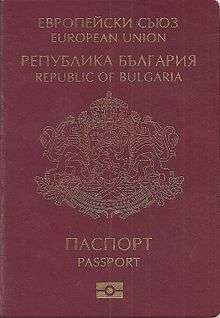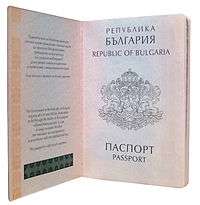Bulgarian passport
| Bulgarian passport | |
|---|---|
 The front cover of a contemporary Bulgarian biometric passport | |
 The data page of a contemporary Bulgarian biometric passport | |
| Date first issued | 29 March 2010 (current biometric version) |
| Issued by |
|
| Type of document | Passport |
| Purpose | Identification |
| Eligibility requirements | Bulgarian citizenship |
| Expiration | 5 years after acquisition for adult, 5 years for children |
Bulgarian passport is an international travel document issued to nationals of Bulgaria, and may also serve as proof of Bulgarian citizenship. Besides enabling the bearer to travel internationally and serving as indication of Bulgarian citizenship, the passport facilitates the process of securing assistance from Bulgarian consular officials abroad or other European Union member states in case a Bulgarian consular is absent, if needed.
According to the 2016 Visa Restrictions Index, Bulgarian citizens can visit 153 countries without a visa or with a visa granted on arrival. Bulgarian citizens can live and work in any country within the EU as a result of the right of free movement and residence granted in Article 21 of the EU Treaty.[1]
Every Bulgarian citizen is also a citizen of the European Union. The passport, along with the national identity card allows for free rights of movement and residence in any of the states of the European Union, European Economic Area and Switzerland
Application
The Ministry of Interior Affairs is responsible for the issuing and renewing of Bulgarian passports.
Use
For travel inside the European Union, (Schengen Area and Common Travel Area countries), as well as Albania, Bosnia and Herzegovina, Georgia, Kosovo, Moldova, Montenegro, Republic of Macedonia, North Cyprus[2] and Serbia, Bulgarian citizens are not required to carry a passport and only need their national identity cards.
The Bulgarian passport gives its bearer the right to assistance and protection by Bulgarian diplomatic missions and consular offices abroad (or to those of other EU member states where a Bulgarian one does not exist).
The passport remains the property of the Republic of Bulgaria.
Categories
- Regular – available to all Bulgarian citizens and valid for five years.
- Service – issued to their staff on request by the respective government agency or directorate.
- Diplomatic – issued to diplomats, high-ranking state officials and their immediate families.
Physical appearance
Bulgarian passports are of the common EU design, being burgundy in colour, with the Bulgarian Coat of arms emblazoned in the centre of the front cover. The text "Европейски съюз" (Bulgarian) / "European Union" (English), the country's official long name "Република България" (Bulgarian) and the English form "Republic of Bulgaria" are inscribed in capital letters above the coat of arms, with the word "паспорт" (Bulgarian) / "passport" (English) below. It is issued for a period of five years, and contains 32 or 48 pages.
Security features include holographic images, micro printing, UV-visible features, watermarks, etc. In addition, the passport holder's photograph is digitally printed directly onto the paper, in standard ink as well as a holographic image. All passports are machine-readable.
Biometric passports
Since 29 March 2010,[3] all newly issued Bulgarian passports contain a chip with biometric data, and also feature the text "Европейски съюз" (Bulgarian) / "European Union" (English) above the country's official name, thus reflecting Bulgaria's EU membership. Additional design changes include the placement of pictures of famous Bulgarian landmarks and monuments on the inside pages of the passports. The new passport fees are 20 € (40 BGN) and with the same validity (5 years).
Passport note

The passports contain a note from the issuing state that is addressed to the authorities of all other states, identifying the bearer as a citizen of that state and requesting that he or she be allowed to pass and be treated according to international norms. The note inside Bulgarian passports states:
The Government of the Republic of Bulgaria requests all Civil and Military Authorities to let through the holder of this passport without hindrance and, in case of need, to render him/her the necessary aid and assistance in accordance with the international law.
This passport is valid for all countries.
Languages
The data page/information page is printed in Bulgarian, English and French.
Visa requirements

In 2016, Bulgarian citizens had visa-free or visa on arrival access to 153 countries and territories, thus ranking the Bulgarian passport 21th in the world.[4]
Visitor statistics
According to the National Statistical Institute of Bulgaria, these were the top 10 destination countries for Bulgarians in 2014:[5]
| Rank | Destination | Number of trips |
|---|---|---|
| 1 | 1 106 913 | |
| 2 | 866 609 | |
| 3 | 321 546 | |
| 4 | 327 033 | |
| 5 | 316 146 | |
| 6 | | 239 310 |
| 7 | 126 313 | |
| 8 | 110 085 | |
| 9 | 102 417 | |
| 10 | 101 737 |
Gallery of historic images

Kingdom of Bulgaria passport circa 1944 
Pre-EU
Bulgarian non-biometric passport (1999–2009)
See also
- Citizenship of the European Union
- Bulgarian nationality law
- Bulgarian identity card
- Uniform civil number
- Driving licence in Bulgaria
- Bulgarian diplomatic missions
- List of passports
- Foreign relations of Bulgaria
- Visa requirements for Bulgarian citizens
- Visa policy of Bulgaria
- Passports of the European Union
References
- ↑ Treaty on the Function of the European Union (consolidated version)
- ↑ http://mfa.gov.ct.tr/consular-info/visa-regulations/
- ↑
- ↑ "Global Ranking - Visa Restriction Index 2016" (PDF). Henley & Partners. Retrieved 23 February 2016.
- ↑